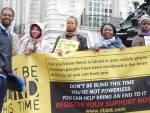
We are all in together. It is about our common humanity. Did you know that by upgrading your mobile or iPad you are helping to rape a Congolese woman? That sounds silly, but that is the reality. The picture was taken on September 14th, 2013 at Piccadilly Circus – London. The event – Dying in the Great Lakes, was raising awareness about the Congolese tragedy and other atrocities committed in the region over the last 20 years.
This is a story of one of many women who, during the Arab Spring, with hundred thousands of others descended in the Tahrir Square and helped to topple Hosni Mubarak. Salma El Tarzi was in 2011 a young woman of 33 years and working as a filmmaker. The Egyptian dictator had been in power for more than 30 years.
The excerpt is from the book Africa Awakening: The Emerging Revolutions by Firoze Manji and Sokari Ekine, which explores an account of movements of change, which crossed the continent from 2011 onward. They have been characterized by uprisings of populations against the regimes in power, asking more freedom and equality.
‘What kept us going was the conviction that we did not have any option – it was either freedom or go to jail.’
Having never been politically active, Salma El Tarzi was sceptical about the protesters’ chances of getting their demands met until the day when she stood on her balcony and saw the crowds. She decided to join the protesters and has not looked back since.
‘I was protesting on my own on the 26th and 27th, but bumped into my younger brother in the crowds by chance on the 28th. We just carried on from then onward.
‘What kept us going was the conviction that we did not have any option – it was either stay and fight for freedom or go to jail.
‘My dad has been very supportive. He was getting to the point where he was telling me and my brother: ‘Don’t run away from gun fire, run towards it.’
‘While in Tahrir we were all receiving threatening calls, telling us that if we didn’t vacate the square we would be hunted and killed. But we didn’t care at that point. We were at the point of no return.
‘Tahrir Square became our mini model of how democracy should be. Living there was not easy. We would use a nearby mosque and I would go to a friend’s house every now and then to wash. But I must admit that conditions were not ideal. It was very cold; we slept on the floor. Some of us had tents and some made their own tents. Let’s put it this way, due to the difficult conditions we called it the ‘smell of a revolution’.
‘I was one of many women, young and old, there. We were as active as the men. Some acted as nurses and looked after the wounded during the battles; others were simply helping with distributing water. But there were s great number of women that were on the front line hurling stones at the police ad pro-Mubarak thugs.
‘The duties in the square were divided. We were very organised. Something changed in the dynamic between men and women in Tahrir. When the men saw that women were fighting in the front line, that changed their perception of us and we were all united. We were all Egyptians now.
‘The general view of women changed for many. Not a single case of sexual harassment happened during the protests up until the last day when Mubarak stepped down. That is a big change for Egypt.
‘The fear barrier was broken for all of us. When we took part in the protests it was just a protest for our basic human rights, but they [the regime] escalated it to a revolution. Their brutality and violence turned it into a revolution. What started as a day of rage turned into a revolution that later toppled the regime that had been in power for 30 years. They [the regime] empowered us through their violence; they made us hold on to the dream of more. We were all walking around with wounds, but we still kept going. We were even treating injured horses that they had used in their brutal attacks against us.
‘Before 25 January I didn’t have faith that my voice could be heard. I didn’t feel like I was in control of my future. The metaphor used by Mubarak that he was our father and we were his children made us feel as though we lacked any motivation.
‘The revolution woke us up – a collective consciousness has been awoken.’
